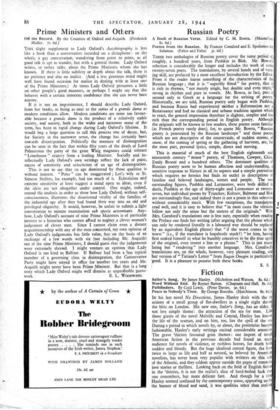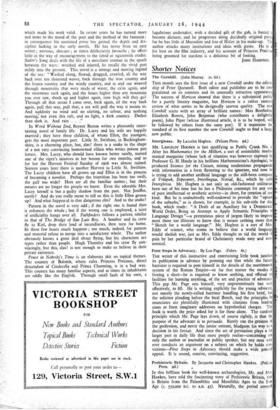Fiction
Sailor's Song. By James Hanley. (Nicholson and Watson. 8s. 6d.) Word Without End. By Reyner Barton. (Chapman and Hall. 8s. 6d.) Pathfinders. By Cecil Lewis. (Peter Davies. 9s. 6d.) Peace in Nobody's Time. By George Borodin. (Hutchinson. 8s. 6d.)
IN his last novel No Directions, James Hanley 'dealt with the id. actions of a small group of flat-dwellers in a single night durini the blitz on London. His new one, Sailor's Song, has an older, if not less simple theme: the attraction of the sea for man. Likt those giants of the novel Melville and Conrad, Hanley has known the life of the seaman, and on him, too, lies the spell of the sea. During a period in which novels by, or about, the proletariat became fashionable, Hanley's early writings excited considerable attention. The grave 'thirties favoured grim themes : our import of tong American fiction in the previous decade had found an eager audience for novels of violence, or ruthless heroes, for death both sudden and bloody. But the huge idealised central figure, the he twice as large as life and half as natural, so beloved by Americ novelists, has never been very popular with writters on this sid of the Atlantic, and they seldom appear outside the pages of roman love stories or thrillers. Looking back on the field of English ficti in the 'thirties, it is not the realist's slice of hard-boiled luck th one remembers, but more delicate fare. And though for a ti Hanley seemed confused by the contemporary scene, appearing uni the banner of blood and sand, it was qualities other than realis which made his work valid. In recent years he has turned more and more to the mood of the poet and the method of the fantasist : in consequence his sustained prose has gained the depth and dis- cipline lacking in the early novels. He has never been art easy writer ; nervous, obscure ; at times deliberately farouche ; he offers little in the way of encouragement to the timid or squeamish reader. Sailor's Song deals with the life of a merchant seaman in the epoch between the wars: wrecked and injured, he recalls the vivid past richly into the present. This novel is a strange and moving legend of the sea: " Washed along, flowed, dragged, crawled, all the way back over ten thousand waves, back through the iron country and the frozen country and the windy country, and in and out weaved through mountains that were made of water, the calm again, and the enormous suck again, and the hours higher than any mountain you ever saw, shock up and higher again, how high will they go? Through all that ocean I came over, back again, all the way back again, pull this way, pull that, a sea will pull the way it means to. And suddenly no wind and no stirring, no colour, and nothing moving, not even this raft, and no light, a dark country. Darker than dark is. And rain . . ."
In Word Without End, Reyner Barton writes a pleasantly enter- taining novel of family life. Dr. Lacey and his wife are happily married ; they have three children, of whom Ellen, the youngest, gets the most important part. Little St. Swithins, in Buckingham- shire, is a charming place, but, alas! there is a snake in the shape of a not very convincing homosexual villain who writes poison pen letters. Mrs. Lacey, who should have known better surely, nursed one of the viper's missives in her bosom for two months, and so for her the Harvest Festival Sunday of 1926 was almost ruined. Sixteen years later there is another Harvest in Little St. Swithins. The Lacey children have all grown up and Ellen is in the process of becoming a novelist. Perhaps the transition has been too swift, the gulf too wide? Here are all the familiar names ; but their owners are no longer the people we knew. Even the adorable Mrs. Lacey herself is but a guilty shadow from the past. Not Jeniffer, surely? And do you really mean to tell us this is little Ellen grown up? And what happened to that dangerous elm? And to the snake?
Pattern in the novel is very odd ; if the right one is found then it enhances the whole ; but if the wrong one is employed, a taint of artificiality hangs over all. Pathfinders follows a pattern similar to that of The Bridge of San Luis Rey. A bomber and its crew fly to Kid, drop their load of incendiaries, then turn for home. In these few hours much happens ; too much, indeed, for pattern and material refuse to merge into a satisfactory whole. The author obviously knows a great deal about flying, but his characters are types rather than people. Hugh Thornley and his crew fly con- vincingly, but this, alas! is not enough to make us believe in their private existence. Peace in Nobody's Time is an elaborate skit on topical themes. The country of Bolonia, where rules Princess Precious, direct descendant of Cinderella and Prince Charming, is in a bad way. This country has many familiar aspects, and at times its inhabitants are oddly like the English. Through small fault of his own, a lugubrious undertaker, with a decided gift of the gab, is forced become dictator, and he progresses along decidedly original path for he has little of Mussolini and less of Hitler in his make-up. Th• author attacks many institutions and ideas with gusto. He is his best on the film industry, and his account of Princess Precious being groomed for stardom is a delicious bit of fooling.
JOHN HAMPSON.



























 Previous page
Previous page